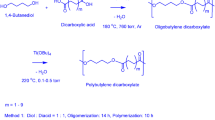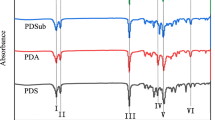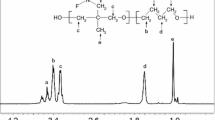Abstract
A series of degradable polyesters was synthesized via melt polymerization of 3,6-dioxaoctane-1,8-dioic acid and five different diols, catalyzed by antimony trioxide (Sb2O3). The polymers were characterized by FT-IR and 1H NMR spectroscopy, gel permeation chromatography (GPC) and differential scanning calorimetry (DSC) analysis. The polydispersity index (PDI = Mw/Mn) of the polyesters ranged from 1.55 to 1.99, the weight-average molecular weight (Mw) from 1.8 × 104 to 3.2 × 104 Da, the melting point from 63 to 123 °C, and the highest decomposition temperature observed was 363 °C. The influence of the structure of the polymer chain on hydrolytic degradability was investigated with tests performed at three different values of pH. The findings obtained provide useful insight for the molecular design and the synthesis of degradable polyesters.
Similar content being viewed by others
References
Mancini SD, Zanin M. Consecutive Steps of PET Recycling by Injection: Evaluation of the Procedure and of the Mechanical Properties[J]. Journal of Applied Polymer Science, 2000, 76(2): 266–275
Nisticò R. Polyethylene Terephthalate (PET) in the Packaging Industry[J]. Polymer Testing, 2020, 90: 106707
Thuy TLB, Anh Nguyen D, Van Ho S, et al. Using Ionic Liquid Catalyst for Conversion of Waste Polyethylene Terephthalate and Soybean Oil to Polyester Polyol[J]. Journal of Applied Polymer Science, 2016, 133(37): 43920
Pham N TH, Nguyen VT. Morphological and Mechanical Properties of Poly(Butylene Terephthalate)/High-density Polyethylene Blends[J]. Advances in Materials Science and Engineering, 2020, 2020: 1–9
Bikiaris DN, Karayannidis GP. Thermomechanical Analysis of Chain-extended PET and PBT[J]. Journal of Applied Polymer Science, 1996, 60(1): 55–61
Obruca S, Sedlacek P, Slaninova E, et al. Novel Unexpected Functions of PHA Granules[J]. Applied Microbiology and Biotechnology, 2020, 104(11): 4795–4810
Malikmammadov E, Tanir TE, Kiziltay A, et al. PCL and PCL-based Materials in Biomedical Applications[J]. Journal of Biomaterials Science, Polymer Edition, 2018, 29(7–9): 863–893
Ding M, Zhang M, Yang J, Qiu JH. Study on the Enzymatic Degradation of PBS and Its Alcohol Acid Modified Copolymer[J]. Biodegradation, 2012, 23(1): 127–132
Watts A, Kurokawa N, Hillmyer MA. Strong, Resilient, and Sustainable Aliphatic Polyester Thermoplastic Elastomers[J]. Biomacromolecules, 2017, 18(6): 1845–1854
Kwiecień M, Adamus G, Kowalczuk M. Selective Reduction of PHA Biopolyesters and Their Synthetic Analogues to Corresponding PHA Oligodiols Proved by Structural Studies[J]. Biomacromolecules, 2013, 14(4): 1181–1188
Nawaz A, Hasan F, Shah AA. Degradation of Poly(ε-caprolactone) (PCL) by a Newly Isolated Brevundimonas sp. Strain MRL-AN1 from Soil[J]. FEMS Microbiology Letters, 2014, 362: 1–7
Ding M, Zhang M, Yang J, Qiu J. Study on the Enzymatic Degradation of Aliphatic Polyester-PBS and Its Copolymers[J]. Journal of Applied Polymer Science, 2012, 124(4): 2902–2907
Sheikholeslami SN, Rafizadeh M, Taromi FA, et al. Material Properties of Degradable Poly(Butylene Succinate-co-fumarate) Copolymer Networks Synthesized by Polycondensation of Pre-homopolyesters[J]. Polymer, 2016, 98: 70–79
Terzopoulou Z, Papadopoulos L, Zamboulis A, et al. Tuning the Properties of Furandicarboxylic Acid-based Polyesters with Copolymerization: A Review[J]. Polymers, 2020, 12(6): 1209
Jacquel N, Saint-Loup R, Pascault JP, et al. Bio-based Alternatives in the Synthesis of Aliphatic-aromatic Polyesters Dedicated to Biodegradable Film Applications[J]. Polymer, 2015, 59: 234–242
Chan WL, Akashi M, Kimura Y, et al. Synthesis and Enzymatic Degradability of an Aliphatic/Aromatic Block Copolyester: Poly(Butylene Succinate)-Multi-poly(Butylene Terephthalate)[J]. Macromolecular Research, 2017, 25(1): 54–62
Lesly DWD, Cheng Z, William MKS, et al. High Performance Sulfur-containing Copolyesters from Bio-sourced Aromatic Monomers[J]. Express Polymer Letters, 2022, 16(1): 102–114
Qian ZY, Li S, He Y, et al. Synthesis and in vitro Degradation Study of poly(Ethylene Terephthalate)/poly(Ethylene Glycol) (PET/PEG) Multiblock Copolymer[J]. Polymer Degradation and Stability, 2004, 83(1): 93–100
Zhou XM. Synthesis and Characterization of Polyester Copolymers Based on poly(Butylene Succinate) and poly(Ethylene Glycol)[J]. Materials Science and Engineering C: Materials for Biological Applications, 2012, 32(8): 2459–2463
Cheng ZZ, Cheng JP, Chen J, et al. Synthesis and Characterization of poly(Terephthalic Acid-2,5-furandicarboxylic Acid-l,8-octanediol) Copolyester[J]. Journal of Wuhan University of Technology — Materials Science Edition, 2021, 36(4): 557–561
Funding
Funded by the Program (BG20190227001) of High-end Foreign Experts of the State Administration of Foreign Experts Affairs (SAFEA) and the Coal Conversion and New Carbon Materials Hubei Key Laboratory in Wuhan University of Science and Technology (WKDM201909)
Author information
Authors and Affiliations
Corresponding author
Rights and permissions
About this article
Cite this article
Cheng, Z., Li, Y., Djouonkep, L.D.W. et al. Degradable Polyesters based on Oxygenated Fatty Acid Monomer. J. Wuhan Univ. Technol.-Mat. Sci. Edit. 37, 753–759 (2022). https://doi.org/10.1007/s11595-022-2592-1
Received:
Accepted:
Published:
Issue Date:
DOI: https://doi.org/10.1007/s11595-022-2592-1




